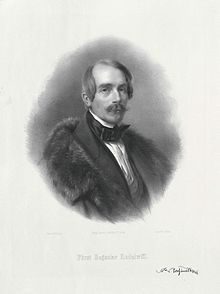Boguslaw von Radziwill
Boguslaw Fürst von Radziwill , completely Boguslaw Fryderyk Wilhelm Ludwik Mariusz Ferdynand August Radziwill , (born January 3, 1809 in Königsberg , † January 2, 1873 in Berlin ) was a member of the Polish-Prussian Princely House of Radziwill , a Prussian lieutenant general and later a local politician in Berlin.
Life
Boguslaw was a son of Anton Heinrich von Radziwill and his wife Louise , nee Princess of Prussia. In the presence of the entire Prussian court and King Friedrich Wilhelm III. Radziwill was baptized in Königsberg .
Radziwill entered the Prussian military service. He held the rank of Second Lieutenant in 1828 and resigned as captain in 1836 . He served on foot in the 1st Guards Regiment . In 1840 he was awarded the character as a Major and 1870 he was promoted to lieutenant general à la suite appointed.
In 1832 Radziwill married Leontyna Gabriela Countess of Clary and Aldringen . The couple had eight children together. Among them were Ferdinand and Edmund . Radziwill was a large landowner. After the father's death in 1833, the property was divided between his two sons. Boguslaw was awarded to Olyka in Volhynia in what is now Ukraine . In Prussia, among other things, he owned Antonin Castle .
After retiring from military service, he was primarily active in charitable, social and political matters. He was a member of the Berlin city council for decades. He was department head for the poor at the Berlin magistrate. As one of the leading members of the Catholic Hedwig Community in Berlin, he made a significant contribution to the establishment of the city's first Catholic hospital in the 1840s.
In 1847 he was a member of the Herrenkuria of the United State Parliament . In the early 1850s he was a member of the Erfurt Union Parliament . Since 1854 he was a hereditary member of the manor . Radziwill was also a member of the Poznan Provincial Assembly . Politically, he was close to the emerging Center Party .
In 1854 Radziwill became an honorary member of the Catholic Reading Association, now K.St.V. Askania-Burgundia in Berlin, the first connection of the KV .
In his memoirs, Otto von Bismarck lamented Radziwill's influence on King Wilhelm I and the establishment of the Catholic department in the Ministry of Spirituality , which would have reinforced the rapid progress of Polish nationality at the expense of the Germans in Poznan and West Prussia . According to Bismarck, the real bearer of Radziwill's influence was Prince Bogislaw, who would also have had an influence as a city councilor in Berlin. With him and his son Ferdinand, Polish and Roman clerical interests flow together. The head of the Catholic department, Adalbert Kraetzig, in the Ministry of Culture had previously been a servant at Radziwill, and Bismarck said he was still as good as a Radziwill serf. In retrospect, Bismarck used this argument of the merging of Polish nationalism with ultramontanism as a justification for the Kulturkampf .
literature
- Hermann Krüger (ed.): Chronicle of the Prussian manor house. A commemorative book to commemorate the manor's 30th anniversary. Berlin 1885, p. 44.
Web links
- Genealogy of the Radziwill family
- Prince Boguslaw Radziwill on thepeerage.com , accessed September 18, 2016.
Individual evidence
- ^ Pastoral care and diakonia in Berlin: Contributions to the relationship between church and city in the 19th and early 20th centuries. Berlin 1990, p. 529 f. ( Digitized version ). Bernhard Meyer: First Catholic hospital in Berlin . In: Berlin monthly magazine ( Luisenstädtischer Bildungsverein ) . Issue 9, 1999, ISSN 0944-5560 , p. 86-89 ( luise-berlin.de ).
- ^ Siegfried Koß, Wolfgang Löhr (Hrsg.): Biographisches Lexikon des KV. 6th part (= Revocatio historiae. Volume 7). SH-Verlag, Schernfeld 2000, ISBN 3-89498-097-4 , p. 51.
- ↑ Otto von Bismarck : Thoughts and Memories . Volume 2, Chapter 24: Culturkampf (digitized: thoughts and memories in the Gutenberg-DE project ), Bismarck's speech on the “Poland question” before the Prussian House of Representatives (January 28, 1886)
| personal data | |
|---|---|
| SURNAME | Radziwill, Boguslaw von |
| ALTERNATIVE NAMES | Radziwill, Boguslaw Prince of; Radziwill, Boguslaw Fryderyk Wilhelm Ludwik Mariusz Ferdynand August (full name) |
| BRIEF DESCRIPTION | German prince, politician |
| DATE OF BIRTH | January 3, 1809 |
| PLACE OF BIRTH | Koenigsberg |
| DATE OF DEATH | January 2, 1873 |
| Place of death | Berlin |
